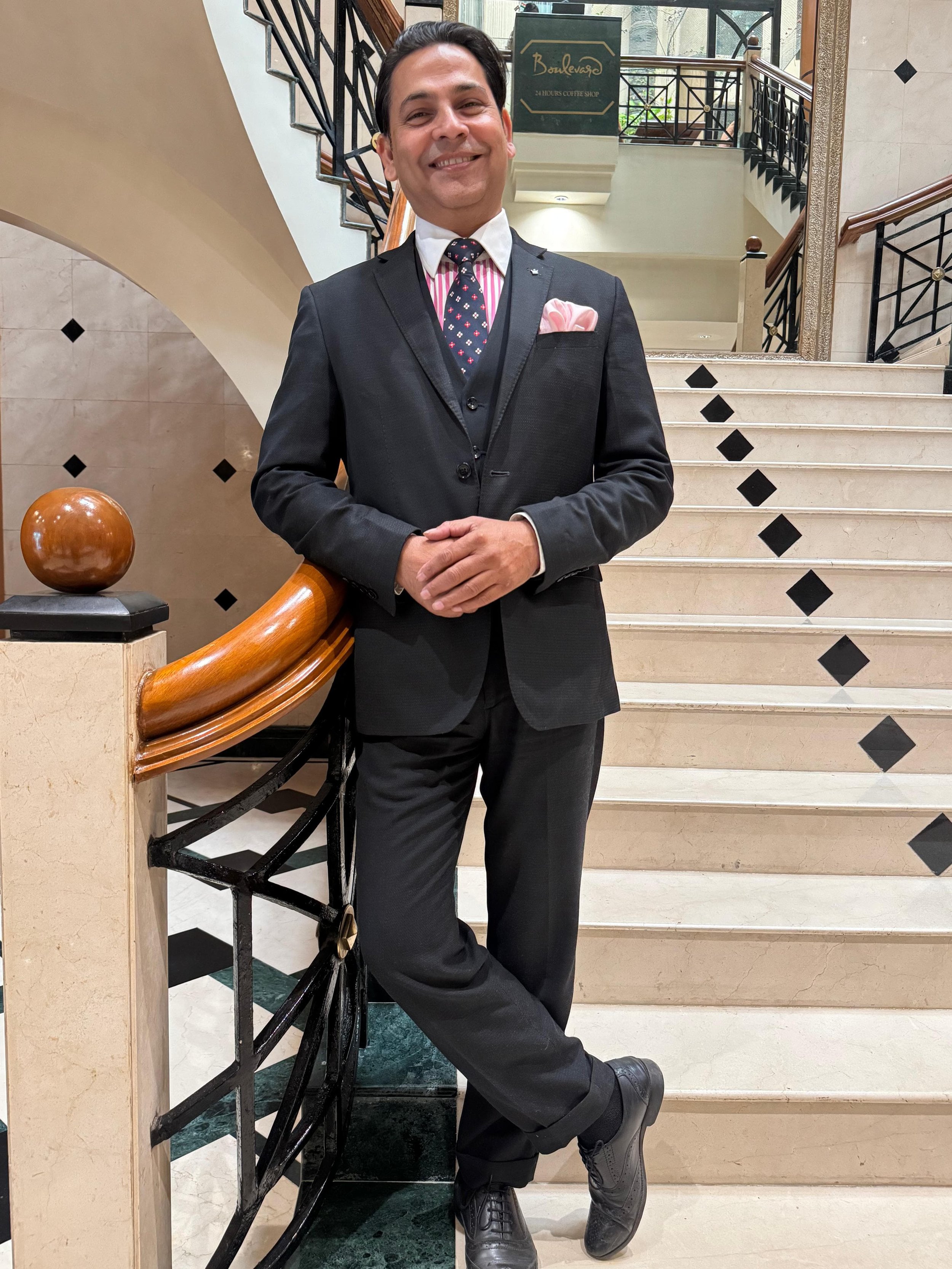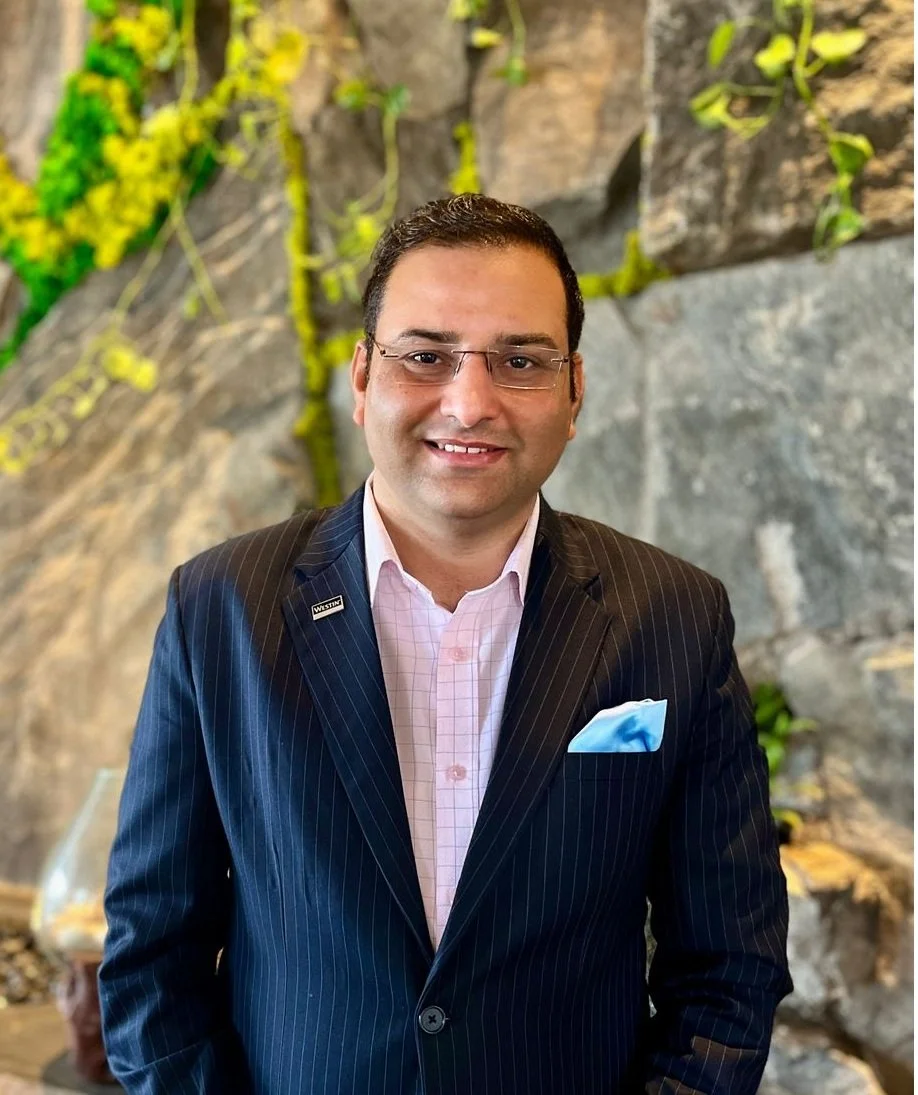Exclusive interview | Pawan Sharma, Sales Manager The Fern Residency Jodhpur
/“Mental flexibility, adaptability, creativity, and personal awareness are key tools in this process that can help hospitality leaders see things visible"
Pawan Sharma
"Mental flexibility, adaptability, creativity and personal awareness are key tools in this process that can help hospitality leaders see things visible".-Pawan Sharma
Editor: Tell us about your journey. How did it all start?
It all started with my interest in the hospitality industry and the genes of discipline I got from my father who was Asst. Commandant in Border Security Force. Being an alumnus of Delhi University and BSF Hostel, I first started to work at Sariska Palace, Alwar. It was a very nice learning experience for me as it was my first. After that, I was placed as Front Office Associate at The Kuchaman Fort which is also a unit of the Sariska Group of Hotels. It was a majestic property located in Nagaur district. Thereafter, I got an opportunity at The Laxmi Niwas Palace Bikaner(A Unit of MRS Hospitality). It is a part of the Royal Residence of the His Highness of Bikaner. Then I moved to Jaipur and worked with Hotel Jaipur Palace (Currently Sarovar Premiere) and Las Vegas (A Unit of Bajor Group of Hotels).
Then I moved to Jodhpur and started working with Hotel Park Plaza (Managed by Sarovar Hotels and Resorts) as Front Office Executive. After that, I was appointed as Front Office Manager at Chandra Group of Hotels where I got to learn and explore many things related to this industry. At that time, the destination wedding concept was introduced by the Group. It expanded with the openings of new Hotels Chandra Imperial and Chandra Grand where I got to learn about pre-opening strategies and execution of plans. I worked with Hotel Niky International as Front Office Manager, Varaha Infra Ltd. as Admin and PR Officer, and then as a Room Division Manager at The Bayan Hotels and Resorts in Udaipur
Currently, I'm designated as Sales Manager at The Fern Residency Jodhpur (A Unit of Pusa Hotels and Resorts). It is one of the best Business Hotels in Jodhpur.It offers 50 rooms, suites, leading environmental practices and various F&B outlets.
Editor: What do you think it takes to succeed in this industry?
Hospitality is all about service, customer support, and personal interaction. Smile, be professional, and know what you are doing. The formula is simple but takes a lot of dedication. It is all about anticipating your client's needs and meeting the highest expectations. A more literal answer would be to find a mentor and shadow them.
Editor: What are the attributes you look for while selecting or hiring? If someone wants to work with you, what should they do?
When I want to hire someone for any current position, it's also helpful to understand where they want to take their career in the coming years. The ability to establish long-term goals and have the self-awareness to know how they want to steer their career will benefit you and your organization. Someone with a strong sense of where they're heading will be more motivated to learn new things, improve their soft skills, and meet the goals established for their position. Sometimes hiring is all about attitude.I also want to be sure that the candidates I'm hiring are honest in every aspect of their lives and career. Integrity means that they won't cut corners, won't provide misinformation, and won't deliberately obscure important information. Determining honesty and integrity doesn't have a specific form of measurement, but you'll be able to see how they comport themselves and verify some of this information in the references.
Editor: What advice would you give to a young, aspiring hotelier for their internship?
Being a successful hotelier starts with getting a high-quality education. Remember, there are no shortcuts to being successful in the hospitality industry. It’s through a quality mindset that you can learn all the necessary hospitality skills. Passion is at the root of success in our industry.
Editor: What are some of the trends you see impacting the hospitality industry?
The term ‘trend’ describes a shift in behavior or a more generalized situation change. With this in mind, hospitality trends may include changes in how customers behave, new ways of providing hospitality services, or general moves towards adopting new hospitality technology. A range of different factors typically influences trends.
For instance, the rise of technology like artificial intelligence has led to a trend where machine learning is used more regularly, and AI technology is deployed more frequently for customer service purposes. Meanwhile, virtual reality technology’s emergence has altered how many hospitality companies promote their products.
There are a few trends accelerated by the pandemic also. For example safety & hygiene. Several hospitality trends can be broadly described as being related to safety and hygiene. These have become especially important with the emergence of COVID, as the world adjusts to the virus and efforts to contain the spread. These concepts must be a priority for hotels, restaurants, bars, and cafes.
Measures here may include the provision of hand gel, increased cleaning of areas where customers will be, implementing policies related to wearing masks or other protective equipment, and ensuring social distancing rules are respected. Any special rules need to be made clear ahead of time and enforced to make people feel safe.
Moreover, hospitality marketing efforts also need to emphasize the safety and hygiene steps you are taking. Explaining these steps could be the difference between generating bookings and having customers look elsewhere. Another one is contactless payments. Many of the biggest hospitality trends are concerned with reducing friction, and contactless payments have been one of the biggest examples. Customers save time sorting through cash or entering their PIN when accepting contactless payments. The emergence of things like Apple Pay and Google Pay also removes the need even to carry a wallet.
besides removing friction and improving the customer experience, the coronavirus pandemic has also increased the demand for contactless payments. Many customers and staff members feel uncomfortable handling cash, and providing the option for contactless payments may be seen by many as a necessity rather than a luxury.
Editor: What tech would you like to see in operations? What operational problems need tech solutions?
Mobile Check-In. Mobile check-in hospitality tech is a very important area to consider because it can help to improve the customer experience at the point of their initial arrival. This is especially beneficial because first impressions can greatly affect how customers ultimately feel about their visit or stay. Crucially, mobile check-ins serve the need for face-to-face customer interactions, meaning customers can potentially have greater flexibility regarding when they check-in. This ties in with wider contactless technology trends within the hospitality industry, and can be especially welcome for those nervous about COVID-like diseases. Another one is Recognition technology. Recognition Technology is one of the most important emerging tech trends, but its potential uses in the hospitality industry are especially interesting. In particular, biometrics is used to usher in a new age of seamless authentications, which could benefit hotel processes and customer purchases.
For example, imagine if a fingerprint or facial recognition technology could be used in your hotel to unlock rooms. Now, consider the uses of the same technology for check-in and check-out purposes. In the future, this technology is also likely to allow for completely seamless purchases, with payments being authenticated by touch.
Editor: What is the one tech/app/software feature you would like to see? This could be for guests, operations, etc.
People sometimes confuse 360 videos with virtual reality. While they use similar technology and are often combined, there are some key differences.
Virtuality reality is a computer-generated simulation of a 3D environment that people can interact with via a headset or other equipment. It helps potential guests feel what it’s like at your property and in your rooms in the first person. Think of it as a video game.
360 video is meant to be watched on your computer, phone, or tablet. It helps show potential guests what it’s actually like at your property. Think of it as a movie.
The opportunity to promote your property with VR hotel tours is only growing. And properties with a virtual tour included are clicked, on average, 10 times more than those without one.
If you already know that the visuals on your website can have a huge impact on sales, then you can imagine what impact a VR tour can have. One can try stitching together popular user-generated visuals to help bring your tour to life.
I like this particular feature because it gives a realistic preview of rooms and event spaces, puts the viewer in the driver's seat, and attracts both individual guests as well as large events looking for hosting.
Editor: Two things you would like to change in the industry.
Would like to build up a standard mechanism for retaining quality staff and provide an individual with a good job culture and work environment as per this social or digital revolution.
The second thing I would like to do is the enhancement of data security.









